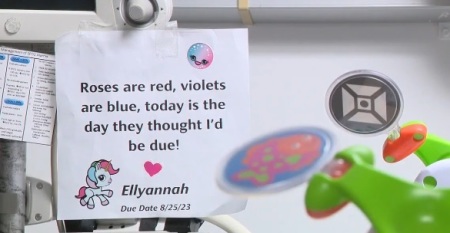Parents of 'miracle baby' born the size of a soda can 'grateful to God' as child continues to improve

A premature baby born roughly the size of a soda can is reportedly continuing to thrive over half a year after she came into the world before 26 weeks gestation, and her family continues to have hope that her condition will improve.
Ellyannah Lopez weighed about 12 ounces when she was born at Cedars-Sinai Medical Center in Los Angeles to Cecia Juarez and Boris Lopez last year. The little girl is one of the smallest babies medical professionals at Cedars-Sinai had ever seen, and her parents could not even hold her for 54 days after she was born due to her frailty.
As KABC reported last Tuesday, the neonatal intensive care unit at Cedars-Sinai is equipped to handle premies like Lopez, who was the first baby to require a high-frequency ventilator known as a jet. Lopez currently weighs 12 pounds and is 7 months old, according to the outlet.
Her parents tried for eight years to have a child. Just as they were about to seek fertility care, Cecia Juarez became pregnant.
"No medication required, so we knew that our baby would be nothing short of a miracle, right?" the mother said in a statement published by KABC.
At 20 weeks gestation, Juarez's blood pressure became dangerously high, and her unborn daughter was not receiving food through the umbilical cord. During pregnancy, nutrients are transferred to babies through the umbilical cord.
Doctors feared that the lives of Juarez and her child were in danger, and the couple worked with their medical team to deliver the child, according to KABC.
"We were going to give her all the chances," Juarez said.
Ellyannah Lopez is smiling and alert even though she has not been able to go home and continues to receive care in the neonatal intensive care unit.
"We're grateful to God for giving us this precious miracle baby," the father, Boris Lopez, told Fox 11, adding that "she's getting better every day."
Dr. Seth Langston of Cedar-Sinai Guerin Children's told KABC that less than 1% of all births are delivered before 26 weeks. The doctor noted that one of the challenges for babies born this early is that their lungs are often underdeveloped, and they require breathing support.
"She was born so small that no one, none of the doctors in that operating room, thought that she would cry," Juarez said. "And when she did, I could hear everybody saying, 'Is that that her?'"
Langston says the baby still has a way to go, noting that Ellyannah Lopez is still working on her breathing and needs to learn how to eat. According to the doctor, this is normal for premature babies, and said these children have "been through so much that they just have a lot of ground to catch up on."
While the premature baby still faces some health issues, the parents continue to have hope, and the couple believes that her condition will keep improving in 2024.
"No matter how small your beginning might be, there's great things ahead of you," Juarez said to her baby girl. "And I'll love you whoever you grow up to be."
According to the U.S. Centers for Disease Control and Prevention, preterm birth affected about one of every 10 infants born in the United States in 2022. While the CDC reported that the preterm birth rate declined 1% in 2022 to 10.4%, preterm birth rates continued to differ by race and ethnicity.
"In 2022, the rate of preterm birth among African-American women (14.6%) was about 50 percent higher than the rate of preterm birth among white or Hispanic women (9.4% and 10.1% respectively)," the CDC stated.
The signs that a woman may be going into labor early include contractions, abdominal cramps, pelvic pressure, and cramps that feel like a menstrual period.
Samantha Kamman is a reporter for The Christian Post. She can be reached at: samantha.kamman@christianpost.com. Follow her on Twitter: @Samantha_Kamman





















